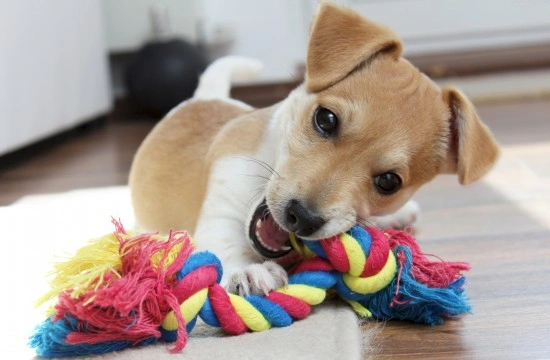
Dealing with a puppy that destroys all of their toys
All dogs enjoy chewing to different degrees, and this is never more true than with puppies! Chewing is actually an important part of canine life, and for the puppy, fulfils a whole multitude of purposes. It can be soothing for stressed pups, and help a fraught puppy to relax and calm down, and it can also help to relieve the pain of teething, when puppies will potentially chew everything in sight!
Picking good chew toys for your dog can also help to keep plaque and tartar under control, and help to keep your dog’s teeth in good condition. However, some dogs seem to be very hard on their toys, and can reduce even the most robust toy to a pile of rags or pieces of plastic within a couple of hours, which can prove both messy and expensive!
In this article, we will look at some of the best toys for chewing dogs, and how to keep your pup from destroying all of their toys, and anything else they can get their teeth into as well!
Appropriate toys
Dogs as a whole and puppies in particular cannot tell the difference between toys that are theirs and those that belong to your children, or things that are not actually toys at all! If you let your dog play with something once, they will take ownership of it, and assume that it is theirs in future, which can cause problems.
Keep all things your pup cannot play with well out of their reach, and restrict your dog’s access to rooms that may have toys lying around, such as your children’s bedrooms.
It is important that dogs have toys of their own, and if you notice your pup taking a particular liking to something that they shouldn’t, try to identify what it is about the object that your pup likes- is it the shape, texture, or something tangible- and try to find them something similar.
Provide a range of different textures, shapes and materials for your dog where their toys are concerned, and try to keep a good stock of the things that are your pup’s favourites. Ensure that they have lots of toys that they are allowed to chew, in order to provide a suitable outlet for those gnawing teeth!
Your dog’s toys and their territory
Ensure that your dog has a designated place to keep his personally assigned toys, such as his crate or a dedicated corner of the room. In time, your dog will come to understand that if you place a toy in this territory, it is his, and that he has the green light to go for it!
If your dog starts chewing on or being destructive with something that is not theirs, take it from them and replace it with something suitable from their own stash. If your pup is reluctant to make the exchange, bribery with treats or smearing something tasty on the replacement toy can help!
Choosing tough toys
If your dog or puppy is particularly hard on their toys, invest in strong, tough toys that are harder to destroy! A very hard rubber ball will prove much more durable than a tennis ball, and many of the differently shaped Kong toys are also built to withstand the rigours of a chewing dog.
Cheaper toys and things made of thin rubber, plastic or fabrics will soon become shredded up by a destructive dog, and if you find that this is the case, save your money for more hardy offerings!
Steer clear of things like teddies and anything else with stuffing, that your dog will soon be able to rip apart and make a real mess of! Also avoid toys with a bell or a squeak inside them unless the toy is really robust, as a dog that chews these to pieces may also ingest the noise maker inside.
Improvised toys that can be destroyed!
Some dogs are simply not satisfied until they have ripped a toy to pieces; you can either try to combat this by providing toys that stand a reasonable chance of survival against your dog, or offer things that are cheap to provide and do not matter if they get broken or destroyed!
And old shoe that you no longer use is good for this, and you can even buy cheap Croc-style rubber shoes for a couple of pounds per pair in some outlets, and provide a supply of these for your dog!
Another great idea is an empty two-litre water or fizzy drink bottle with the label and lid removed. Place a couple of treats or pieces of kibble inside of it, and your dog will have a great time shaking it around to try to decant the treat, or crushing, gnawing on or pawing at the bottle to break it up.
Excessive or problematic toy destruction
It is important to ensure that a destructive dog still gets toys, and to accept that some things are simply going to get chewed up and ruined! However, it is also important to be aware of problem chewing, or excessive chewing that may indicate a problem with one of the teeth coming through into the jaw, or obsessive compulsive chewing, which may be a symptom of anxiety.
If you have any doubts or concerns, pop your dog along to the vet for a check up.



